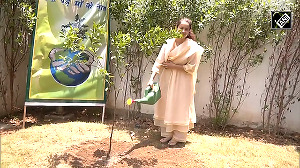Do you have mutual fund and personal finance-related queries?
Please ask your questions HERE and rediffGURU Janak Patel, a certified financial planner accredited by the Financial Planning Standards Board, India, and CEO and founder of InfiniumWealth, will answer them.

Anonymous: I want guidance on retirement planning. Having corpus of Rs 3 cr in liquid, Rs 45L savings in FD. With no bank loans and own home. Have 2 more houses and getting rent of Rs 37k.
Kids are in class 1 and Sr Kg. I need to provide support for their education which might overall cost around Rs 2 cr.
Is my corpus enough to retire now and take care of cost of living?
My age is 37 years. My monthly expense is around Rs 1.5 lakh. I have medical insurance policy of Rs 20 lakh. And I have two polices like yearly Rs 10L for next 5 years for the kids.
The current state of your finances:
- Liquid corpus: Rs 3 crores
- Savings FD: Rs 45 lakh
- Rent income: Rs 37,000
- Monthly expenses: Rs 1.5 lakh
If we consider the above, then the monthly expenses will be covered for about 35 years (assuming inflation of 5-6 per cent and average returns of 8 per cent). This doesn't include the education expenses for your two children.
Retirement is now typically planned for up to age of 85 years (ie 43 years for you). In your situation, you have to support monthly expenses during retirement and your children's education.
You have two more houses and without knowing your intent for their usage/sale and their value, it becomes difficult to indicate if they would be sufficient to support the two major goals you have listed.
Also, with your current lifestyle and medical expenses, your health insurance of Rs 20 lakh may need to be ramped up to a much higher amount.
You have not shared more details of your insurance policies to understand if they are the appropriate ones and if the risk cover is sufficient.
Another important aspect to consider for early retirement is: How will you keep yourself occupied? You will have a lot of time on hand. Do you plan to monetise your time by engaging in some financially rewarding activities? This will also have an impact on the overall state of your well-being -- financially and psychologically.
I would highly recommend that you consult with a certified financial planner who can guide you with a well-defined financial plan. This will include all your requirements and provide you with options and alternatives.
You will need to have a plan of investment that meets your goals, plan risk covers for securing future of your family (life and health) and consider tax implications of investing and subsequent utilisation of the corpus for goals. A personalised plan will help you understand the right time for retirement and what to expect pre and post retirement.
Anonymous: I am 40 yr old divorced man with a 10 year old son.
I live in my own house in a tier 2 city.
I have savings of around Rs 5 cr and no liabilities.
I am expecting to live until I am 80.
Can I retire now expecting Rs 3 lakh monthly income matching inflation for the rest of my life?
I have accounted my son's education, medical insurance and yearly vacation in India. Would that be enough? If not, then how much should I save until I turn 45 yrs old? Thank you!
At age of 40, you have already accumulated Rs 5 crores with no liabilities and your own house; that is a tremendous achievement.
The monthly income of Rs 3 lakh (inflation adjusted) for 40 years as mentioned will cover your requirements for your son's education, medical insurance and vacation. If we assume inflation of 6 per cent and average return on your corpus of 12 per cent over the next 40 years, you will require approximately Rs 6 crores (not considering tax implications).
Please understand this amount will be exhausted over the next 40 years, so if you plan to leave behind any legacy for your son/grandchildren, then you will need more.
Also, your corpus amount needs to be well-diversified into aggressive and conservative investments to support your monthly requirements over the next 40 years.
Please consult a CFP for guidance in this matter as, along with your monthly income expectation, you will need to plan for tax implications.
The overall strategy for investment and subsequent withdrawal needs to be planned taking all these factors into consideration.
A CFP will be able to craft a personalised plan to meet your requirements and provide options and alternatives to achieve them.
Dr: Hello sir, I am a doctor, 37. Started practising last year so no previous investment.
I want suggestion for investment and regarding NPS. Should I opt for NPS or go for mutual funds as I can't keep track on stocks? Please guide.
I have corpus for child and want retirement funds good for my standard.
As you can't keep track of stocks, let’s rule out direct stock/equity investment.
NPS: It’s a good tool for people who want regular income during retirement as pension. So, through your earning life, you contribute to NPS and save for the future. Contributions are until retirement age.
They are prescribed allocations to equity and debt funds (similar to mutual fund schemes) that are managed by fund managers.
After retirement, you can withdraw 60 per cent of the funds without any tax liability (it’s an option) and the remaining funds in the NPS will provide you with pension income.
The pension income is considered a source of income in your hand and hence taxable as per prevailing tax laws.
Mutual funds: This investment option doesn't have a time limit for you to contribute.
The allocation to different types of mutual fund schemes are also at the discretion of the investor.
Some schemes like ELSS do provide tax benefit under the old tax regime.
While withdrawing money from mutual funds does have tax implications, they are considered more tax efficient as they are not considered as income; you are taxed on the capital gains only.
Regular income can be derived from mutual funds at the time of retirement using the SWP (systematic withdrawal plan) option or withdrawing a lump sum amount -- it's flexible and again at the discretion of the investor.
I would recommend that you consult a CFP who can prepare a personalised financial plan for your requirements.
A CFP will do a detailed study of your requirements and preferences and also do a risk assessment. This will include all your requirements, provide you with options and alternatives and recommend the right product mix to achieve them.
You will need to have a plan of investment that meets your goals (retirement and child specific), plan risk covers for securing the future of your family (life and health) and consider tax implications of investing and subsequent utilisation of the corpus for goals. This will help you understand the right time for retirement and what to expect pre and post retirement.
- You can ask rediffGURU Janak Patel your questions HERE.
Disclaimer: This article is meant for information purposes only. This article and information do not constitute a distribution, an endorsement, an investment advice, an offer to buy or sell or the solicitation of an offer to buy or sell any securities/schemes or any other financial products/investment products mentioned in this QnA or an attempt to influence the opinion or behaviour of the investors/recipients.
Any use of the information/any investment and investment related decisions of the investors/recipients are at their sole discretion and risk. Any advice herein is made on a general basis and does not take into account the specific investment objectives of the specific person or group of persons. Opinions expressed herein are subject to change without notice.










